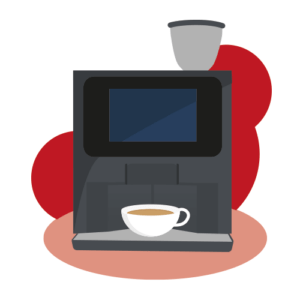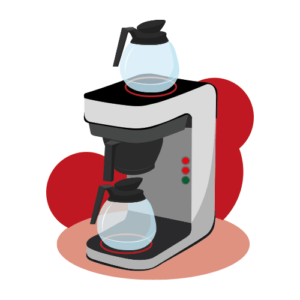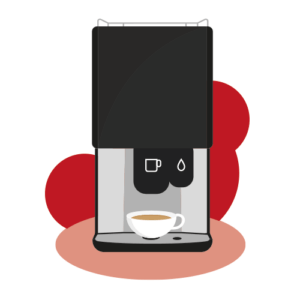Choosing the Best Commercial Coffee Machine For Your Business
9th April 2021
So, you’re thinking about investing in a brand new commercial coffee machine for your business, charity or public sector organisation?
It can be hard to know where to start when you’re not a professional barista and don’t know your crema from your cold brew. Fortunately, our coffee experts have produced a layman’s guide that will explain all the options available and the factors you’ll need to consider when selecting a new commercial coffee machine.
Remember, we’re always happy to help, so if you have any questions or queries at all, please do not hesitate to get in touch with our friendly and knowledgeable team.
Types of Commercial Coffee Machine
There are four main types of commercial coffee machine that you’ll need to consider for your business. It’s important you understand the differences between the machines when purchasing a new commercial coffee machine, so we’ve compiled a short description, along with the main pros and cons of each below.

Bean to Cup Coffee Machines
A bean to cup coffee machine is a fully automated coffee machine, doing all the work of a professional coffee machine and grinder, but without the need for a fully trained barista,
Bean to cup machines grind coffee beans on demand to brew the freshest and most delicious cup of coffee possible. When coffee beans are ground they lose approx. 60% of their aroma within about 15 minutes. Exposure to air also increases the oxidation rate, so the flavour deteriorates the longer the beans are exposed to the air. Therefore, the fresher the ground coffee, the more delicious and aromatic the final cup of coffee.
The freshly ground coffee is then combined with hot water or steamed milk to create authentic coffee shop favourites including americano, latte, cappuccino and more. Some bean to cup machines even include a section for chocolate powder for creating creamy hot chocolate and mocha.
Advantages of a Bean to Cup Coffee Machine
- Grinds beans right before brewing to preserve the taste
- Quick, convenient and easy to operate
- Speciality drinks at a touch of a button
- Great long term investment – barista-quality coffee without having to visit the coffee shop
- Most bean to cup machines include energy-saving technology
Disadvantages of a Bean to Cup Coffee Machine
- Higher upfront cost
- Requires regular cleaning to prevent blockages and breakdowns
- Not suitable for smaller commercial environments

Filter Coffee Machines
A filter coffee machine works much in the same way as a traditional espresso machine, in that boiling water flows through ground coffee beans to create coffee. However, with an espresso machine, this is done with pressure, but a filter coffee machine relies on gravity.
To operate, simply place a paper filter in the basket and add your coffee before pouring cold water into the reservoir. The filter coffee machine will heat the water, before spraying evenly on the coffee grounds where the water will run through to create fresh coffee.
Whilst you can use already ground coffee in your filter coffee machine, for a tastier cup we recommend investing in a grinder and grinding your own beans on demand.
Advantages of a Filter Coffee Machine
- Low upfront cost for the machine itself
- Cost per cup much lower than other types of commercial coffee machine
- High capacity solution – can brew and store high volumes of coffee
Disadvantages of a Filter Coffee Machine
- Longer brew time – up to 15 minutes
- Can’t prepare milk-based drinks such as latte or cappuccino
- Paper filters can soak up the natural oils in coffee, which can take away the flavour

Instant Coffee Machine
Instant Coffee Machines use sachets of instant coffee powder which is stored inside the machine. When you order a coffee by pressing a button, a measured amount of the powder is dispensed into a cup, where boiling water and milk powder (if required) is added.
Advantages of an Instant Coffee Machine
- Produces drinks very quickly
- Instant coffee lasts longer and takes up less space than fresh beans
- Less mess and cleaning involved than a bean to cup machine
- Lower cost per drink – very cost-effective
Disadvantages of an Instant Coffee Machine
- Lower quality coffee experience
- Often not energy efficient
Traditional Espresso Machines
Traditional espresso machines are essentially the machines professional baristas use to create speciality coffees in your local coffee shop. They usually consist of one or more “group heads” where water is forced through ground coffee beans under pressure to create espresso. The espresso is then used to create other drinks by adding hot water from the built-in boiling water dispenser or milk foam created using a steam wand.
Although a traditional espresso machine produces the very highest quality of coffee, operating one is something of science that requires extensive barista training. Everything from the fineness or coarseness of the coffee grounds, to how it is pressed down into the portafilter, can affect the final quality and taste of the coffee.
Advantages of a Traditional Espresso Machine
- Reliable, robust and lasts longer than other types of machine
- Built-in milk frother to create authentic milk-based speciality coffees
- Versatility – allows you to customise your drink
- Better extraction process for the best quality coffee
Disadvantages of a Traditional Espresso Machine
- Highest upfront cost
- Extensive training required
- Inconsistent quality as product depends on the barista
- Hands-on operation and not suitable for self-service – can be dangerous if not operated by a trained professional
Factors to Consider When Selecting a Commercial Coffee Machine
Operation & Practicality
The first thing to consider when choosing a commercial coffee machine for your office, car dealership, restaurant or café is who will be operating your machine.
Restaurants and cafés will generally want to serve the best quality coffee available and will invest time in training their team to prepare the perfect cup, so may opt for a traditional coffee machine.
If however your commercial coffee machine will be used on a self-service basis, such as in an office or canteen, then you will need a machine that is extremely easy to use, such as a bean to cup or instant coffee machine.
Demand & Volume
The next factor you’ll want to consider is the volume of coffee your commercial coffee machine will be required to brew per day. An easy way of working this out is to look at the number of users the machine will be catering for. In the case of a workplace, this will be the number of employees. On average we drink about 2 cups of coffee per day in the UK, so if you have 50 team members you would need a coffee machine capable of brewing 100 cups per day.
For those requiring a self-service option, there is a huge range of both bean to cup and instant coffee machines that can prepare anything between 20 and 250 cups per day.
In very high volume catering environments, such as conference venues or breakfast buffets, a filter coffee machine may be more appropriate, brewing and storing large volumes of black coffee that the user can then personalise to their taste with milk and sugar. Some filter coffee machines even feature a hot water boiler, so tea can be prepared alongside the filter coffee.
Variety of Drinks
If you’re looking for simple black coffee then a filter coffee machine will be just the ticket. If however, you’re looking to offer a more diverse range of drinks, then you’ll want to consider a traditional espresso machine, bean to cup machine or instant coffee machine.
There are literally no limits with a traditional espresso machine as the espresso dispensed can be used to create any speciality coffee, with whatever milk you prefer (cows milk, oat milk, soy milk etc.) and then personalised further with whipped cream, syrups and more.
For those without a professional barista on hand, a bean to cup machine offers similar quality speciality drinks, though the level of control is more limited. Most machines offer between 6 and 15 different types of speciality coffee, including americano, latte and cappuccino. Models such as the Schaerer Soul Bean to Cup Machine, however, offer much higher levels of personalisation, which you can design and store on the coffeeMYstation smartphone app.
Quality
The quality of a cup of coffee is dependent on several different factors, most importantly:
Freshness of the coffee beans
Once roasted, beans start to go stale due to exposure to oxygen. Therefore, if you’re using a bean to cup machine or grinding your own beans, it’s important not to overfill your bean hopper as the beans will deteriorate over time.
Freshness of the grind
As already mentioned, once beans are ground they start to release the aromas that create a great-tasting cup of coffee. Therefore, a bean to cup machine, filter coffee or traditional espresso machine will produce a better cup of coffee.
Pressure in the coffee machine
Bean to cup and traditional espresso machines use pressure to force hot water through the coffee grounds, which creates a better final cup. A filter coffee machine relies on gravity, so the brew takes longer and the taste deteriorates.
Water quality
Many bean to cup machines feature a built-in water filter that extracts any minerals or impurities from the water. It is important to replace this filter and to descale the machine regularly to maintain water quality.
Which coffee machine produces the best tasting coffee?
The best cup of coffee will always come from a traditional espresso machine, prepared by a fully trained barista. However, a top of the range bean to cup coffee machine will produce a speciality coffee that’s not that different to one produced by a barista. Instant coffee machines produce the poorest quality cup, but they do offer other benefits in terms of being low cost, quick and convenient.
Upkeep & Maintenance
All commercial coffee machines will require a certain element of cleaning and maintenance to keep them in tip-top condition, though this does vary depending on the make and model of the machine.
In addition to maintaining basic hygiene standards like you would any other kitchen appliance, it is of vital importance that you descale your machine, especially if you’re in a hard water area.
Most bean to cup and instant coffee machines include self-cleaning and descaling programmes whereby you add a tablet or solution to the machine, push a button and it carries out the process itself. Filter coffee machines and traditional coffee machines require more manual cleaning and maintenance.
Purchasing a Commercial Coffee Machine – Rent, Lease or Buy?
A commercial coffee machine is a big investment, so at Liquidline we offer several different payment options including lease hire on a 3 or 5 year contract. When you lease a commercial coffee machine from Liquidline it will include free delivery, installation and onsite training with one of our engineers.
If you choose to purchase your consumables, such as coffee beans, disposable cups and ancillaries, from Liquidline we’ll also include free service and maintenance of your commercial coffee machine. We have one of the largest in-house coffee engineering teams, with team members based throughout the UK to ensure we can resolve any issues promptly, reducing the impact on your business should a fault occur.
We aim to respond to any emergency calls within 30 minutes and will attempt to fix your commercial coffee machine remotely. If this is not possible an engineer will be dispatched and we will aim to fix your machine within 8 working hours, meaning most issues will be resolved the same day.
Next Steps…
Now you’re a commercial coffee machine aficionado, you may have a better idea of your requirements and the type of coffee machine you’d like to explore.
To discover the perfect machine for your commercial organisation, simply complete the form on our contact page and a member of our team will be in touch. We’ll then discuss your needs over a friendly, informal call before issuing you with our recommendations and a totally bespoke, no-obligation quote.
